Unit 4 Friends forever Using ideas 课件(共47张,内嵌音频)-高中英语外研版(2019)必修第一册(共48页PPT)
文档属性
| 名称 | Unit 4 Friends forever Using ideas 课件(共47张,内嵌音频)-高中英语外研版(2019)必修第一册(共48页PPT) |  | |
| 格式 | pptx | ||
| 文件大小 | 31.4MB | ||
| 资源类型 | 教案 | ||
| 版本资源 | 外研版(2019) | ||
| 科目 | 英语 | ||
| 更新时间 | 2025-05-30 17:00:12 | ||
图片预览

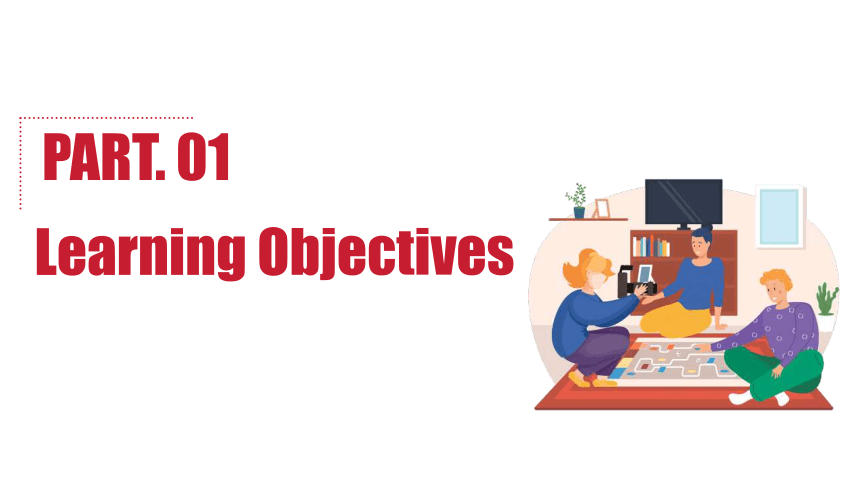
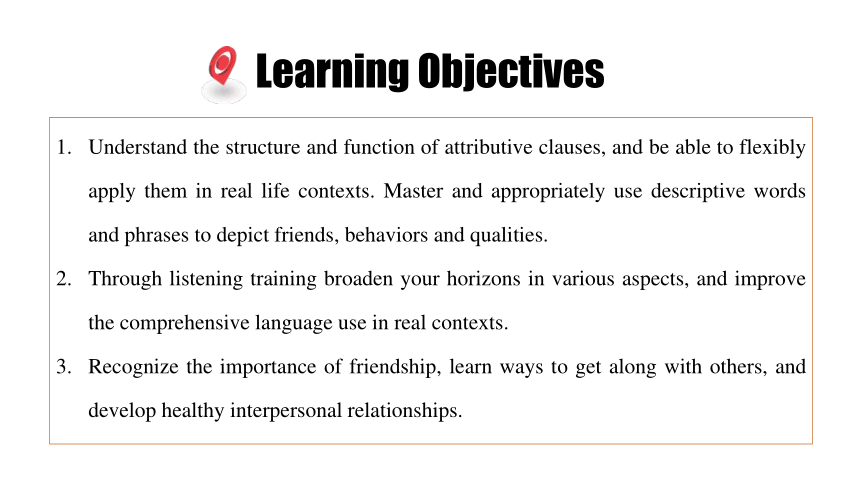
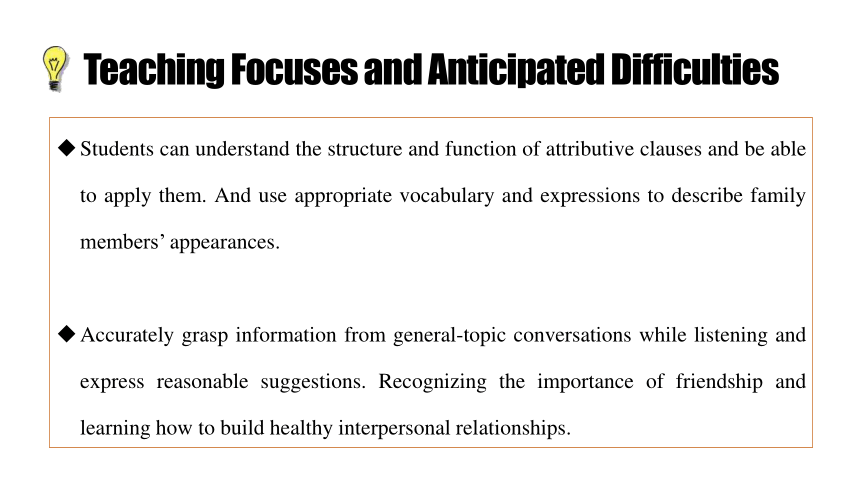

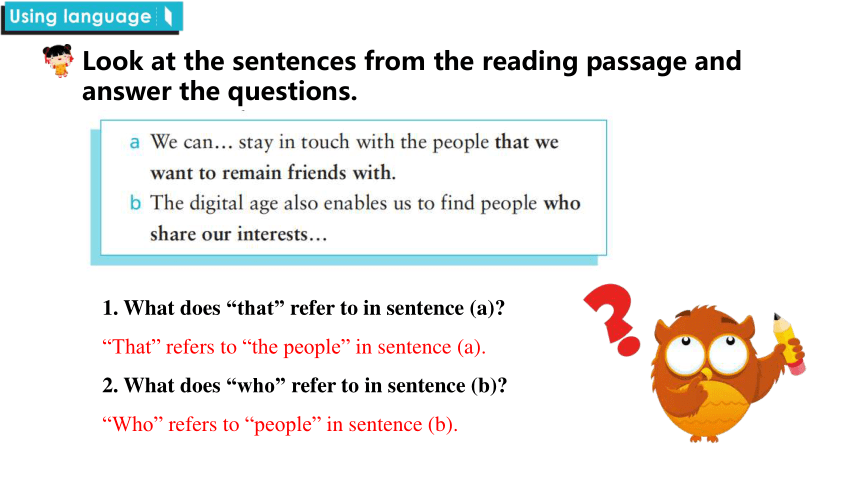
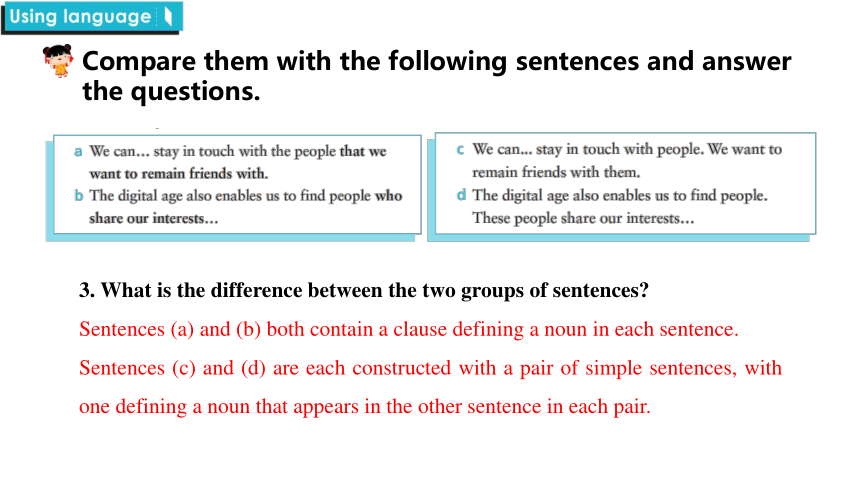

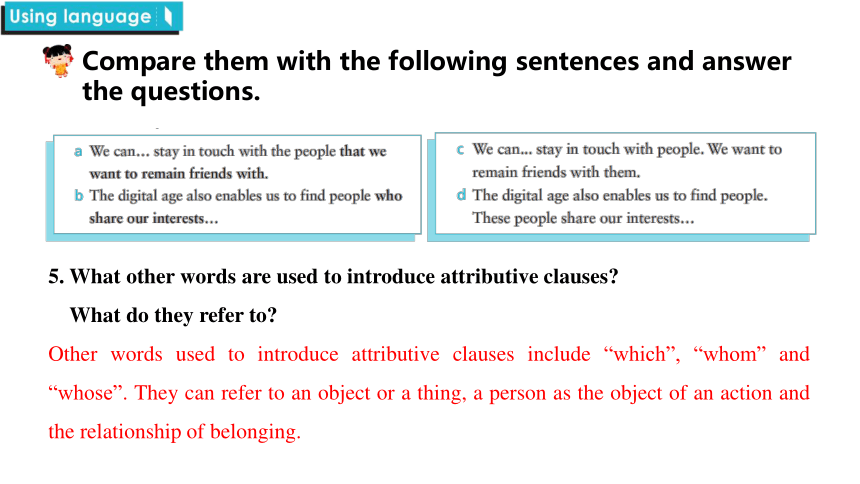
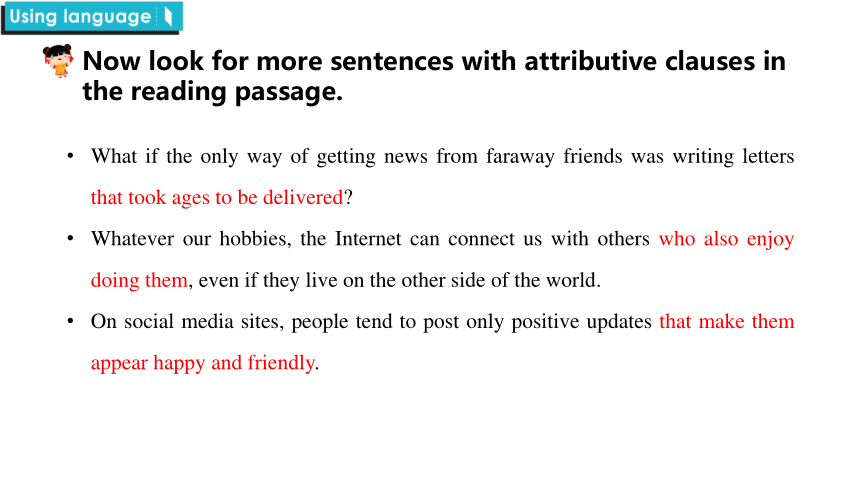
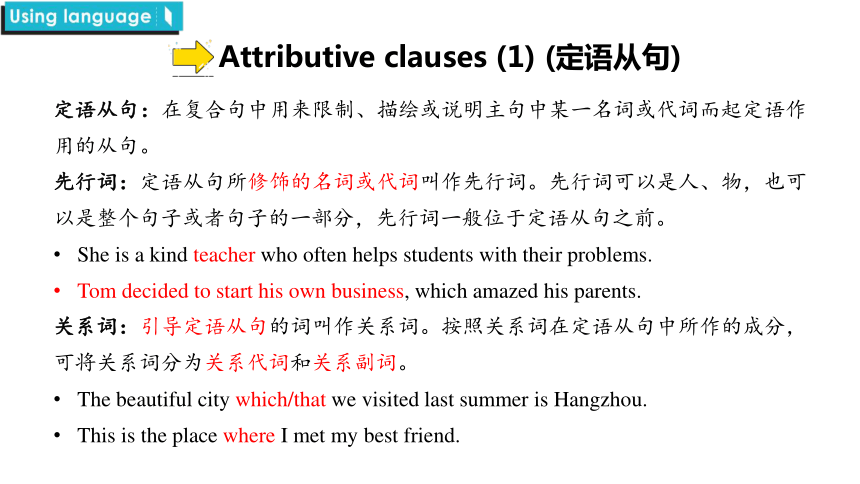
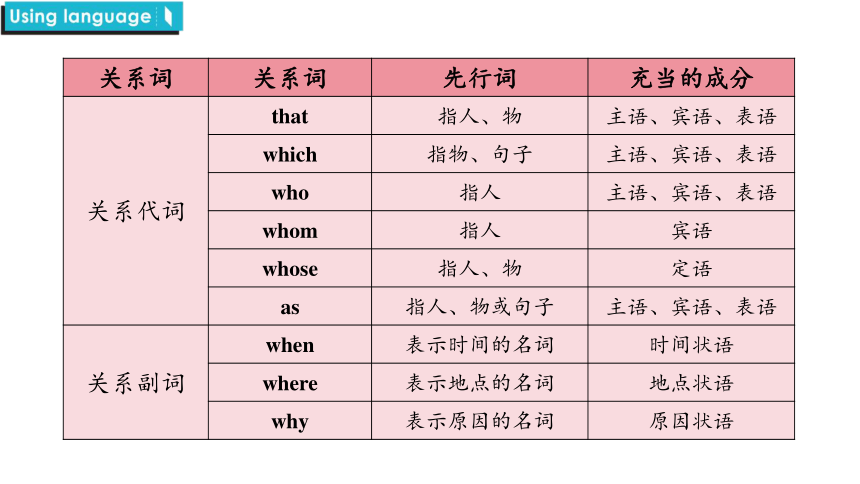
文档简介
(共47张PPT)
Using language
Unit 4
Friends
forever
Learning Objectives
PART. 01
Understand the daily study and life of British middle school students by watching videos. Based on your own daily study and life, compare the study and life in Chinese and British schools, and find out the similarities and differences between the two. Talk about your first impression of high school life, and have a preliminary perception of the study and life in the senior high school stage.
Learning Objectives
Understand the structure and function of attributive clauses, and be able to flexibly apply them in real life contexts. Master and appropriately use descriptive words and phrases to depict friends, behaviors and qualities.
Through listening training broaden your horizons in various aspects, and improve the comprehensive language use in real contexts.
Recognize the importance of friendship, learn ways to get along with others, and develop healthy interpersonal relationships.
Understand the daily study and life of British middle school students by watching videos. Based on your own daily study and life, compare the study and life in Chinese and British schools, and find out the similarities and differences between the two. Talk about your first impression of high school life, and have a preliminary perception of the study and life in the senior high school stage.
Teaching Focuses and Anticipated Difficulties
Students can understand the structure and function of attributive clauses and be able to apply them. And use appropriate vocabulary and expressions to describe family members’ appearances.
Accurately grasp information from general-topic conversations while listening and express reasonable suggestions. Recognizing the importance of friendship and learning how to build healthy interpersonal relationships.
Grammar
PART. 02
Look at the sentences from the reading passage and answer the questions.
1. What does “that” refer to in sentence (a)
“That” refers to “the people” in sentence (a).
2. What does “who” refer to in sentence (b)
“Who” refers to “people” in sentence (b).
Compare them with the following sentences and answer the questions.
3. What is the difference between the two groups of sentences
Sentences (a) and (b) both contain a clause defining a noun in each sentence.
Sentences (c) and (d) are each constructed with a pair of simple sentences, with one defining a noun that appears in the other sentence in each pair.
Compare them with the following sentences and answer the questions.
4. Why does the author choose to use sentences (a) and (b) in the reading passage
Because there is a closer link and connection between “people” and the clause defining it in sentences (a) and (b). It also makes the passage clearer, and creates an emphatic effect on the people or things being defined.
Compare them with the following sentences and answer the questions.
5. What other words are used to introduce attributive clauses
What do they refer to
Other words used to introduce attributive clauses include “which”, “whom” and “whose”. They can refer to an object or a thing, a person as the object of an action and the relationship of belonging.
Now look for more sentences with attributive clauses in the reading passage.
What if the only way of getting news from faraway friends was writing letters that took ages to be delivered
Whatever our hobbies, the Internet can connect us with others who also enjoy doing them, even if they live on the other side of the world.
On social media sites, people tend to post only positive updates that make them appear happy and friendly.
Attributive clauses (1) (定语从句)
定语从句:在复合句中用来限制、描绘或说明主句中某一名词或代词而起定语作用的从句。
先行词:定语从句所修饰的名词或代词叫作先行词。先行词可以是人、物,也可以是整个句子或者句子的一部分,先行词一般位于定语从句之前。
She is a kind teacher who often helps students with their problems.
Tom decided to start his own business, which amazed his parents.
关系词:引导定语从句的词叫作关系词。按照关系词在定语从句中所作的成分,可将关系词分为关系代词和关系副词。
The beautiful city which/that we visited last summer is Hangzhou.
This is the place where I met my best friend.
关系词 关系词 先行词 充当的成分
关系代词 that 指人、物 主语、宾语、表语
which 指物、句子 主语、宾语、表语
who 指人 主语、宾语、表语
whom 指人 宾语
whose 指人、物 定语
as 指人、物或句子 主语、宾语、表语
关系副词 when 表示时间的名词 时间状语
where 表示地点的名词 地点状语
why 表示原因的名词 原因状语
一、定语从句的分类
1. 限制性定语从句
限制性定语从句对先行词起修饰、限制作用,是句中不可缺少的部分,主句和从句关系非常紧密,不能用逗号分开。
He bought the book that/which is recommended by the teacher.
2. 非限制性定语从句
非限制性定语从句往往是对先行词或整个主句进行附加说明,主从句的关系并不十分密切,若将其去掉,主句的意义仍然完整清楚。从句和主句之间往往用逗号隔开。除了that以外,其他的关系代词及关系副词都和限制性定语从句用法相同,只是所有关系词都必须写上,不能省略。
Beijing, which is the capital of China, has a long history.
二、关系代词
1. that
that只可用于限制性定语从句中,既可以指代人又可以指代物,在定语从句中作主语、宾语、表语,作宾语时可省略,但不能作介词宾语。指人时相当于who/whom,指物时相当于which。
The man that/who is standing over there is my uncle.
2. which
指代物或句子或句子的一部分,在定语从句中作主语、宾语或表语,作宾语时可省略。作介词的宾语且介词提前时which不可省略。
The building, which was built in the 19th century, is now a museum.
The project, which we have been working on for months, will be completed next week.
3. who
who指代人,在定语从句中作主语、宾语、表语,作宾语时可省略,但介词提到关系代词前,不能用who。在限制性定语从句中who可用that代替,作宾语时可与whom替换。
She is the girl who won the first prize in the singing competition.
4. whom
whom指代人,在定语从句中作宾语,在限制性定语从句中可用who或that代替。介词提到关系代词前,从句只能用“介词+whom”引导。
The woman whom you talked to just now is my English teacher.
The boy, whom we invited to our party, is very talented in painting.
5. whose
whose指人或物,在定语从句中作定语。当从句中含有与先行词有所属关系的词的时候,我们就用whose引导定语从句,相当于of whom或of which。
The house whose roof was damaged in the storm needs to be repaired.
除了用 whose 表所属关系以外,在 whom 和 which 之前加of也可以表示所属关系(即of whom, of which)。这时名词需要特指,应加定冠词,放在 of whom, of which 之前或之后均可。
I have a friend whose father is a famous scientist.
→ I have a friend, the father of whom is a famous scientist.
→ I have a friend of whom the father is a famous scientist.
The students, some of whose parents are doctors, are very hardworking.
→ The students, some of the parents of whom are doctors, are very hardworking.
→ The students, the parents of some of whom are doctors, are very hardworking.
6. as
①用于限制性定语从句。指人或物且在限制性定语从句中作主语、宾语、表语。
例:Books such as those you mentioned are very helpful for our study.
②用于非限制性定语从句。指代整个主句或主句中的一部分。
As can be seen, the environment is getting better with our efforts.
as 引导非限制性定语从句时的常见表达
as we all know众所周知 as I can remember 正如我所记得的
as often happens这经常发生 as we expect 正如我们预料的那样
as you see 这一点你明白 as has been said before 如前所述
as is well known 众所周知 as was expected 正如预料的那样
as can be seen 看得出来 as has been said above 如上所述
关系代词that与which指物时常可互换,以下情况用that:
1. 先行词是all, few, little, much, something, nothing, anything等不定代词;
Is there anything that I can do for you
2. 先行词被the only, the very, any, every, no, all, few, little, much等修饰;
She is the only girl that can play this difficult piece of music.
3. 先行词被序数词或形容词最高级修饰;
This is the first movie that I've watched in the theater this year.
4. 先行词既有人又有物。
We talked about the people and things that we remembered in our hometown.
Attention
关系代词用who不用that的情况:
1. 当先行词为人称代词 he, she, they 或 one(s), anyone, nobody 等指人的不定代词时。
Anyone who wants to join the club can sign up here.
2. 当指人的先行词是those,或先行词被 those 所修饰时。
Those who are kind-hearted always like to help others.
3. 当指人的先行词是序数词或被序数词修饰时。
The second person who came into the room was my teacher.
Attention
关系代词用who不用that的情况:
4. 当指人的先行词和定语从句被其他成分分隔时。
The man is in the garden who you met at the party last week.
5. 当指人的先行词由两个定语从句修饰(即双重定语从句时,第二个定语从句只能用who/whom引导,不能用that。第二个定语从句的关系代词不可省略。
He is the excellent student I admire who won the first prize in the competition.
6. there be结构中先行词指人时。
There is a kind-hearted man who often helps the poor.
关系代词用that不用who的情况:
1. 在特殊疑问句中,如果开头的疑问代词是who,为了避免重复,定语从句宜使用 that引导,而不用 who。
Who is the girl that is singing on the stage
2. 当先行词为疑问代词 who, which 时。
Who that has a dream doesn't want to make it come true
3. 当关系代词在定语从句中作表语或宾语补足语时,定语从句也不用 who引导,而用that,或者省略关系代词that。这一般是确认性表语。
He has become the person that he always wanted to be. (that在定语从句中作表语)
4. 当先行词同时包含人和物时。
They talked about the teachers and schools that they visited last summer.
Attention
Rewrite the underlined sentences with that, which, who, whom or whose.
1. Lucy is my friend who/that has a hearing problem.
2. So I learnt a new language which/that allows me to “speak” with my hands.
3. Lucy is a smart girl whose ideas are always inspiring.
4. I sometimes have problems (that/which) I can’t solve.
5. Lucy is a good listener (whom/who/that) I enjoy sharing moments of my life with.
Complete the online forum post with that, which, who, whom or whose.
that/which
whose
who/that
which/that
whom/who
Read the recipe and work out the meaning of the words in bold.
two cups of trust,
one spoon of encouragement,
three spoons of helpfulness,
three cups of good conversation,
one pack of similar interests,
one glass of comfort,
two drops of patience,
one bag of passion,
one piece of generosity,
… and a slice of humour!
Like any good soup,
this won’t fail to make you smile when you’re feeling down.
All you need to get started is a box of love.
Pour it into a pot and mix it with five grams of smiles.
Next, add:
Friendship soup
Match the words in bold in Activity 4 to the dictionary entries.
generosity
trust
passion
helpfulness
comfort
humour
encouragement
patience
Work in pairs. Talk about the keywords of your “Friendship soup” and create your own e up with more words if you can.
Friendship soup
generosity
passion
ability
encouragement
attraction
bravery
carefulness
confidence
cooperation
creativity
dedication
diligence
trust
duty
energy
sincerity
helpfulness
comfort
patience
humour
Listening
PART. 03
The word “friend” comes from the Old English word “freond”, meaning “the loved one”.
According to a study from Yale University and the University of California at San Diego in 2014, good friends are often genetically similar. In fact, good friends can share up to 1% of the same genes – as much as we might share with our great-great-great grandparents!
Did You Know
Listen to the conversation and number the events in the correct order.
4
2
5
3
1
6
Listen again and complete the table.
Suggestion Comment
We could send him 1_________of the places we visit. That might make him 2_______________.
How about sending him 3________________ from every place we visit They may 4_________ to arrive.
How about having a(n) 5____________with him at different places They aren’t 6_________ in some places.
We can print Matt’s photo on a 7_____________ cardboard cutout and take photos with it everywhere we go. It will feel like he’s there with us and Matt will 8_______ at the photos.
photos
feel even worse
funny postcards
take days
video chat
allowed
life-sized
laugh
Now talk about how Andy and Clara give suggestions.
Listen again if necessary.
Work in pairs. Act out the conversation to solve a problem between friends.
student A
One of your friends has been avoiding you all week. He / She doesn’t talk to you and refuses to text or phone you back. Ask Student B for suggestions and give comments on them.
student B
Student A has a problem and needs your help. Find out what the problem is and give him / her some suggestions as to how to solve it.
Work in pairs. Act out the conversation to solve a problem between friends.
Work in pairs. Think about a problem that has come up between you and your friends and have a similar conversation.
Vocabulary
1. inspiring
inspire sb. to do sth. 激励某人做某事
inspire sb. with sth. = inspire sth. in sb. 用……激发某人;激发某人的某种情感
例题:
The teacher’s passion for literature inspired the students __________(explore) classic novels they had never considered reading before.
to explore
Vocabulary
2. comfort
turn to sb. for comfort 向某人寻求安慰
be a great comfort to sb. 是某人的巨大安慰
take/draw comfort from 从……获得安慰
in comfort 舒适地
comfortable adj. 舒服的;自在的
例题:
She settled into the armchair, wrapped in a warm blanket, and read her book ____ comfort.
in
Vocabulary
3. patience
patient adj. 耐心的 n. 病人
patiently adv. 耐心地
be patient with 对……有耐心
be impatient with 对……不耐烦
have no/little patience with 不能容忍……
lose/run out of patience (with sb.) (对某人)失去耐心
with patience (= patiently ) 耐心地
例题:
Parents need to be patient ____ young children as they learn to express their emotions.
with
Vocabulary
4. generosity
generous adj. 慷慨的,大方的
generously adv. 慷慨地,大方地
be generous to sb. 对某人慷慨
be generous with sth. 在某方面大方,不吝啬某物
one’s generosity to/towards... 某人对……的慷慨
例题:
The company is generous _______ its employees, offering competitive salaries and excellent benefits.
to
Vocabulary
5. anxious
be anxious for sb./about sth. 为……担心/担忧
be anxious for sth. 渴望……
be anxious to do sth. 渴望做某事
anxiety n. 焦虑;忧虑;渴望
例题:
The teacher was anxious ______ the students during the difficult exam, hoping they’d stay calm.
for
Exercise
PART. 04
1. Music has always been a deep p_________(强烈的情感) of his, and he plays three instruments fluently.
2. Her q_______(品德) of kindness shines through in how she helps others without expecting anything in return.
3. Many t_________(青少年) engage in creative hobbies like painting, writing, or playing musical instruments.
4. We can p________(推迟) the decision by a few days to allow more time for discussion.
assion
Exercise: 单词拼写
uality
eenagers
ostpone
1. The living room is furnished with a ____________(comfort) sofa and warm lighting, perfect for relaxing.
2. They traveled to a ________(distance) village in the mountains to study local culture.
3. Even in difficult times, his positive attitude remains ________(inspire) to everyone around him.
4. The author’s ___________(humour) novel combines mystery and comedy, creating a unique reading experience.
5. Exercising regularly is a great way to relieve _________(anxious) and improve mental health.
comfortable
Exercise: 用所给词的适当形式填空
distant
inspiring
humorous
anxiety
Summary
PART. 05
Using language
Grammar
Vocabulary
Listening
定语从句
定语从句的分类
注意事项
关系代词
Homework
PART. 06
Review what you have learnt in this class;
Write a short passage on friendship using the attributive clauses.
Homework
See you next class!
Using language
Unit 4
Friends
forever
Learning Objectives
PART. 01
Understand the daily study and life of British middle school students by watching videos. Based on your own daily study and life, compare the study and life in Chinese and British schools, and find out the similarities and differences between the two. Talk about your first impression of high school life, and have a preliminary perception of the study and life in the senior high school stage.
Learning Objectives
Understand the structure and function of attributive clauses, and be able to flexibly apply them in real life contexts. Master and appropriately use descriptive words and phrases to depict friends, behaviors and qualities.
Through listening training broaden your horizons in various aspects, and improve the comprehensive language use in real contexts.
Recognize the importance of friendship, learn ways to get along with others, and develop healthy interpersonal relationships.
Understand the daily study and life of British middle school students by watching videos. Based on your own daily study and life, compare the study and life in Chinese and British schools, and find out the similarities and differences between the two. Talk about your first impression of high school life, and have a preliminary perception of the study and life in the senior high school stage.
Teaching Focuses and Anticipated Difficulties
Students can understand the structure and function of attributive clauses and be able to apply them. And use appropriate vocabulary and expressions to describe family members’ appearances.
Accurately grasp information from general-topic conversations while listening and express reasonable suggestions. Recognizing the importance of friendship and learning how to build healthy interpersonal relationships.
Grammar
PART. 02
Look at the sentences from the reading passage and answer the questions.
1. What does “that” refer to in sentence (a)
“That” refers to “the people” in sentence (a).
2. What does “who” refer to in sentence (b)
“Who” refers to “people” in sentence (b).
Compare them with the following sentences and answer the questions.
3. What is the difference between the two groups of sentences
Sentences (a) and (b) both contain a clause defining a noun in each sentence.
Sentences (c) and (d) are each constructed with a pair of simple sentences, with one defining a noun that appears in the other sentence in each pair.
Compare them with the following sentences and answer the questions.
4. Why does the author choose to use sentences (a) and (b) in the reading passage
Because there is a closer link and connection between “people” and the clause defining it in sentences (a) and (b). It also makes the passage clearer, and creates an emphatic effect on the people or things being defined.
Compare them with the following sentences and answer the questions.
5. What other words are used to introduce attributive clauses
What do they refer to
Other words used to introduce attributive clauses include “which”, “whom” and “whose”. They can refer to an object or a thing, a person as the object of an action and the relationship of belonging.
Now look for more sentences with attributive clauses in the reading passage.
What if the only way of getting news from faraway friends was writing letters that took ages to be delivered
Whatever our hobbies, the Internet can connect us with others who also enjoy doing them, even if they live on the other side of the world.
On social media sites, people tend to post only positive updates that make them appear happy and friendly.
Attributive clauses (1) (定语从句)
定语从句:在复合句中用来限制、描绘或说明主句中某一名词或代词而起定语作用的从句。
先行词:定语从句所修饰的名词或代词叫作先行词。先行词可以是人、物,也可以是整个句子或者句子的一部分,先行词一般位于定语从句之前。
She is a kind teacher who often helps students with their problems.
Tom decided to start his own business, which amazed his parents.
关系词:引导定语从句的词叫作关系词。按照关系词在定语从句中所作的成分,可将关系词分为关系代词和关系副词。
The beautiful city which/that we visited last summer is Hangzhou.
This is the place where I met my best friend.
关系词 关系词 先行词 充当的成分
关系代词 that 指人、物 主语、宾语、表语
which 指物、句子 主语、宾语、表语
who 指人 主语、宾语、表语
whom 指人 宾语
whose 指人、物 定语
as 指人、物或句子 主语、宾语、表语
关系副词 when 表示时间的名词 时间状语
where 表示地点的名词 地点状语
why 表示原因的名词 原因状语
一、定语从句的分类
1. 限制性定语从句
限制性定语从句对先行词起修饰、限制作用,是句中不可缺少的部分,主句和从句关系非常紧密,不能用逗号分开。
He bought the book that/which is recommended by the teacher.
2. 非限制性定语从句
非限制性定语从句往往是对先行词或整个主句进行附加说明,主从句的关系并不十分密切,若将其去掉,主句的意义仍然完整清楚。从句和主句之间往往用逗号隔开。除了that以外,其他的关系代词及关系副词都和限制性定语从句用法相同,只是所有关系词都必须写上,不能省略。
Beijing, which is the capital of China, has a long history.
二、关系代词
1. that
that只可用于限制性定语从句中,既可以指代人又可以指代物,在定语从句中作主语、宾语、表语,作宾语时可省略,但不能作介词宾语。指人时相当于who/whom,指物时相当于which。
The man that/who is standing over there is my uncle.
2. which
指代物或句子或句子的一部分,在定语从句中作主语、宾语或表语,作宾语时可省略。作介词的宾语且介词提前时which不可省略。
The building, which was built in the 19th century, is now a museum.
The project, which we have been working on for months, will be completed next week.
3. who
who指代人,在定语从句中作主语、宾语、表语,作宾语时可省略,但介词提到关系代词前,不能用who。在限制性定语从句中who可用that代替,作宾语时可与whom替换。
She is the girl who won the first prize in the singing competition.
4. whom
whom指代人,在定语从句中作宾语,在限制性定语从句中可用who或that代替。介词提到关系代词前,从句只能用“介词+whom”引导。
The woman whom you talked to just now is my English teacher.
The boy, whom we invited to our party, is very talented in painting.
5. whose
whose指人或物,在定语从句中作定语。当从句中含有与先行词有所属关系的词的时候,我们就用whose引导定语从句,相当于of whom或of which。
The house whose roof was damaged in the storm needs to be repaired.
除了用 whose 表所属关系以外,在 whom 和 which 之前加of也可以表示所属关系(即of whom, of which)。这时名词需要特指,应加定冠词,放在 of whom, of which 之前或之后均可。
I have a friend whose father is a famous scientist.
→ I have a friend, the father of whom is a famous scientist.
→ I have a friend of whom the father is a famous scientist.
The students, some of whose parents are doctors, are very hardworking.
→ The students, some of the parents of whom are doctors, are very hardworking.
→ The students, the parents of some of whom are doctors, are very hardworking.
6. as
①用于限制性定语从句。指人或物且在限制性定语从句中作主语、宾语、表语。
例:Books such as those you mentioned are very helpful for our study.
②用于非限制性定语从句。指代整个主句或主句中的一部分。
As can be seen, the environment is getting better with our efforts.
as 引导非限制性定语从句时的常见表达
as we all know众所周知 as I can remember 正如我所记得的
as often happens这经常发生 as we expect 正如我们预料的那样
as you see 这一点你明白 as has been said before 如前所述
as is well known 众所周知 as was expected 正如预料的那样
as can be seen 看得出来 as has been said above 如上所述
关系代词that与which指物时常可互换,以下情况用that:
1. 先行词是all, few, little, much, something, nothing, anything等不定代词;
Is there anything that I can do for you
2. 先行词被the only, the very, any, every, no, all, few, little, much等修饰;
She is the only girl that can play this difficult piece of music.
3. 先行词被序数词或形容词最高级修饰;
This is the first movie that I've watched in the theater this year.
4. 先行词既有人又有物。
We talked about the people and things that we remembered in our hometown.
Attention
关系代词用who不用that的情况:
1. 当先行词为人称代词 he, she, they 或 one(s), anyone, nobody 等指人的不定代词时。
Anyone who wants to join the club can sign up here.
2. 当指人的先行词是those,或先行词被 those 所修饰时。
Those who are kind-hearted always like to help others.
3. 当指人的先行词是序数词或被序数词修饰时。
The second person who came into the room was my teacher.
Attention
关系代词用who不用that的情况:
4. 当指人的先行词和定语从句被其他成分分隔时。
The man is in the garden who you met at the party last week.
5. 当指人的先行词由两个定语从句修饰(即双重定语从句时,第二个定语从句只能用who/whom引导,不能用that。第二个定语从句的关系代词不可省略。
He is the excellent student I admire who won the first prize in the competition.
6. there be结构中先行词指人时。
There is a kind-hearted man who often helps the poor.
关系代词用that不用who的情况:
1. 在特殊疑问句中,如果开头的疑问代词是who,为了避免重复,定语从句宜使用 that引导,而不用 who。
Who is the girl that is singing on the stage
2. 当先行词为疑问代词 who, which 时。
Who that has a dream doesn't want to make it come true
3. 当关系代词在定语从句中作表语或宾语补足语时,定语从句也不用 who引导,而用that,或者省略关系代词that。这一般是确认性表语。
He has become the person that he always wanted to be. (that在定语从句中作表语)
4. 当先行词同时包含人和物时。
They talked about the teachers and schools that they visited last summer.
Attention
Rewrite the underlined sentences with that, which, who, whom or whose.
1. Lucy is my friend who/that has a hearing problem.
2. So I learnt a new language which/that allows me to “speak” with my hands.
3. Lucy is a smart girl whose ideas are always inspiring.
4. I sometimes have problems (that/which) I can’t solve.
5. Lucy is a good listener (whom/who/that) I enjoy sharing moments of my life with.
Complete the online forum post with that, which, who, whom or whose.
that/which
whose
who/that
which/that
whom/who
Read the recipe and work out the meaning of the words in bold.
two cups of trust,
one spoon of encouragement,
three spoons of helpfulness,
three cups of good conversation,
one pack of similar interests,
one glass of comfort,
two drops of patience,
one bag of passion,
one piece of generosity,
… and a slice of humour!
Like any good soup,
this won’t fail to make you smile when you’re feeling down.
All you need to get started is a box of love.
Pour it into a pot and mix it with five grams of smiles.
Next, add:
Friendship soup
Match the words in bold in Activity 4 to the dictionary entries.
generosity
trust
passion
helpfulness
comfort
humour
encouragement
patience
Work in pairs. Talk about the keywords of your “Friendship soup” and create your own e up with more words if you can.
Friendship soup
generosity
passion
ability
encouragement
attraction
bravery
carefulness
confidence
cooperation
creativity
dedication
diligence
trust
duty
energy
sincerity
helpfulness
comfort
patience
humour
Listening
PART. 03
The word “friend” comes from the Old English word “freond”, meaning “the loved one”.
According to a study from Yale University and the University of California at San Diego in 2014, good friends are often genetically similar. In fact, good friends can share up to 1% of the same genes – as much as we might share with our great-great-great grandparents!
Did You Know
Listen to the conversation and number the events in the correct order.
4
2
5
3
1
6
Listen again and complete the table.
Suggestion Comment
We could send him 1_________of the places we visit. That might make him 2_______________.
How about sending him 3________________ from every place we visit They may 4_________ to arrive.
How about having a(n) 5____________with him at different places They aren’t 6_________ in some places.
We can print Matt’s photo on a 7_____________ cardboard cutout and take photos with it everywhere we go. It will feel like he’s there with us and Matt will 8_______ at the photos.
photos
feel even worse
funny postcards
take days
video chat
allowed
life-sized
laugh
Now talk about how Andy and Clara give suggestions.
Listen again if necessary.
Work in pairs. Act out the conversation to solve a problem between friends.
student A
One of your friends has been avoiding you all week. He / She doesn’t talk to you and refuses to text or phone you back. Ask Student B for suggestions and give comments on them.
student B
Student A has a problem and needs your help. Find out what the problem is and give him / her some suggestions as to how to solve it.
Work in pairs. Act out the conversation to solve a problem between friends.
Work in pairs. Think about a problem that has come up between you and your friends and have a similar conversation.
Vocabulary
1. inspiring
inspire sb. to do sth. 激励某人做某事
inspire sb. with sth. = inspire sth. in sb. 用……激发某人;激发某人的某种情感
例题:
The teacher’s passion for literature inspired the students __________(explore) classic novels they had never considered reading before.
to explore
Vocabulary
2. comfort
turn to sb. for comfort 向某人寻求安慰
be a great comfort to sb. 是某人的巨大安慰
take/draw comfort from 从……获得安慰
in comfort 舒适地
comfortable adj. 舒服的;自在的
例题:
She settled into the armchair, wrapped in a warm blanket, and read her book ____ comfort.
in
Vocabulary
3. patience
patient adj. 耐心的 n. 病人
patiently adv. 耐心地
be patient with 对……有耐心
be impatient with 对……不耐烦
have no/little patience with 不能容忍……
lose/run out of patience (with sb.) (对某人)失去耐心
with patience (= patiently ) 耐心地
例题:
Parents need to be patient ____ young children as they learn to express their emotions.
with
Vocabulary
4. generosity
generous adj. 慷慨的,大方的
generously adv. 慷慨地,大方地
be generous to sb. 对某人慷慨
be generous with sth. 在某方面大方,不吝啬某物
one’s generosity to/towards... 某人对……的慷慨
例题:
The company is generous _______ its employees, offering competitive salaries and excellent benefits.
to
Vocabulary
5. anxious
be anxious for sb./about sth. 为……担心/担忧
be anxious for sth. 渴望……
be anxious to do sth. 渴望做某事
anxiety n. 焦虑;忧虑;渴望
例题:
The teacher was anxious ______ the students during the difficult exam, hoping they’d stay calm.
for
Exercise
PART. 04
1. Music has always been a deep p_________(强烈的情感) of his, and he plays three instruments fluently.
2. Her q_______(品德) of kindness shines through in how she helps others without expecting anything in return.
3. Many t_________(青少年) engage in creative hobbies like painting, writing, or playing musical instruments.
4. We can p________(推迟) the decision by a few days to allow more time for discussion.
assion
Exercise: 单词拼写
uality
eenagers
ostpone
1. The living room is furnished with a ____________(comfort) sofa and warm lighting, perfect for relaxing.
2. They traveled to a ________(distance) village in the mountains to study local culture.
3. Even in difficult times, his positive attitude remains ________(inspire) to everyone around him.
4. The author’s ___________(humour) novel combines mystery and comedy, creating a unique reading experience.
5. Exercising regularly is a great way to relieve _________(anxious) and improve mental health.
comfortable
Exercise: 用所给词的适当形式填空
distant
inspiring
humorous
anxiety
Summary
PART. 05
Using language
Grammar
Vocabulary
Listening
定语从句
定语从句的分类
注意事项
关系代词
Homework
PART. 06
Review what you have learnt in this class;
Write a short passage on friendship using the attributive clauses.
Homework
See you next class!
